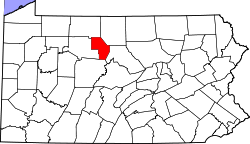Truman, Pennsylvania | |
|---|---|
Unincorporated community | |
 PA 120 westbound in Truman | |
| Coordinates: 41°28′37″N78°22′07″W / 41.47694°N 78.36861°W | |
| Country | United States |
| State | Pennsylvania |
| County | Cameron |
| Elevation | 1,227 ft (374 m) |
| Time zone | UTC-5 (Eastern (EST)) |
| • Summer (DST) | UTC-4 (EDT) |
| Area code | 814 |
| GNIS feature ID | 1199698 [1] |
Truman is an unincorporated community in Cameron County, Pennsylvania, United States. [1]

